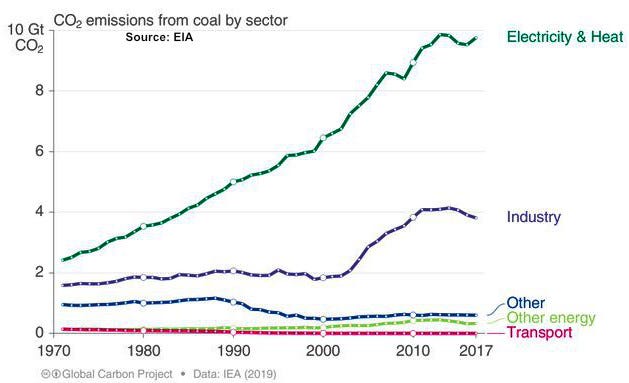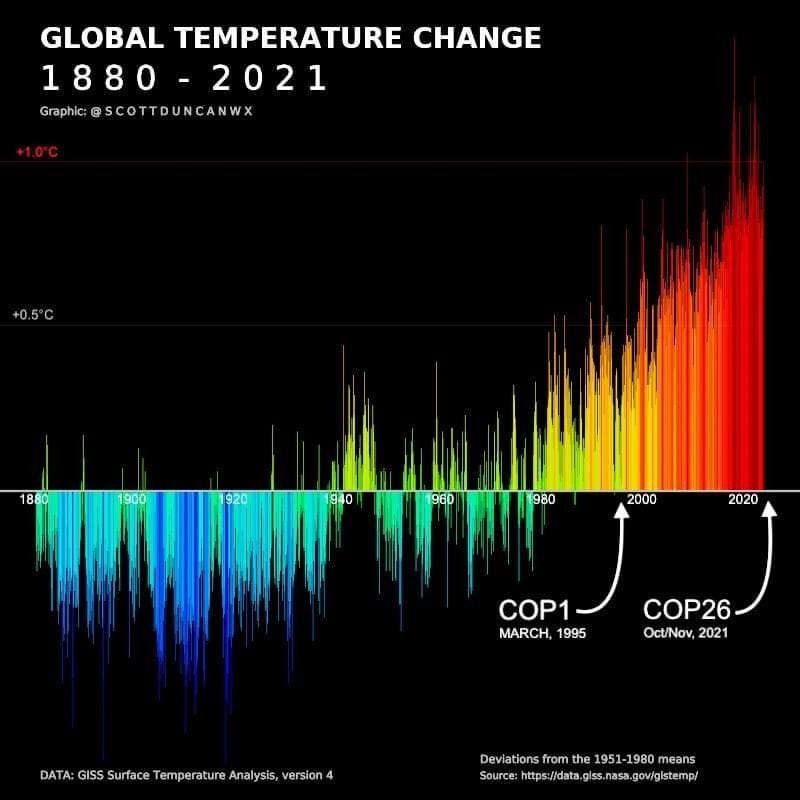The Great Pause Week 88: Lucid Water and Lush Mountains
"When the COP concluded in Glasgow it had given coal a pass for the next 40 years."
In the days following the close of the 26th meeting of 200 countries to reverse climate change, I am still trying to understand what went wrong and whether it can be corrected. Extinction Rebellion, the Sunrise Movement and others are asking themselves, as they should, whether their strategies and tactics are adequate to the task. Other movements started by activists in the 90s continue to grow, iterate, and cross-pollinate: the Great Green Wall; ecovillages; transition towns; ecocities; ecosystem restoration camps. As Lennon said, “You say you got a real solution/Well, you know/We’d all love to see the plan.” But then we need to ask ourselves if any of these plans has the speed needed.
Bottom-up street protest is not change. We also need change from the top — government policy. I am left with images in my head of the closing plenary when COP President Alok Sharma shed tears as he accepted the compromise to water-down the final document. At the last minute, the representative of India, Bhupender Yadav, interposed a block to consensus with the backing of China, Brazil and South Africa by declining to go along with the complete phase out of coal that 196 countries had taken two years of negotiations to agree to, including hazardous shuttle diplomacy during the pandemic by Mr. Sharma and UN Secretary General Antonio Guterres. The look on Mr. Yadav’s face is one of smug satisfaction. The mood in the hall was grim.There are good governments and bad governments, just as there are good people and criminal sociopaths. It is not entirely binary, there is a spectrum, but the premise of the United Nations is that dialogue and peer-pressure are better tools than barbed wire, poison gas and atomic bombs.
India remains an outlier, its position having changed little since the Kyoto COP in 1995 — “the wealthy countries polluted their way to riches and India must be allowed to do the same; after that, we can talk.”I paraphrase.
This is premised on the idea that a consumer society of 2 billion Indians, each with the footprint of a modern USAnian, is a desirable end — and indeed, inevitable.
China, never a human rights paragon, has been gradually migrating its climate position, due to one Xie Zhenhua. A little over a decade ago, China had exactly the same diplomatic position as India — strongly arguing against any restrictions on their coal-fueled economic growth, eyes looking skyward to a Pizza Hut on every corner. They said the overdeveloped nations should be leading the way to a medium standard by shrinking their share of the pie, not pushing underdeveloped nations to underdevelop faster. China made a lot of friends with that line. Eat the rich.
“Xie is not a bureaucrat. He has the style of Chinese officials in the 1980 and 1990s when they had the guts to shoulder risks and take initiatives, which you can’t see in today’s Chinese officials. That is not because the officials today don’t want to [have that style], but because the current system doesn’t allow them to,” said Li Shuo, senior global policy advisor at Greenpeace East Asia, who has met Xie in person at climate conferences. “Talking to Xie feels like communicating with a real human being, whereas speaking to other Chinese officials feels more like talking to robots.”
— Jane Li, "China’s Xie Zhenhua is the most important person attending COP26," Quartz, Nov 11, 2021.
Xie has been a close advisor to Chinese president Xi Jinping since 2004 when Xie crafted the policy known as “Green GDP” — shifting China away from a polluting parrot of Western countries and towards a more traditional circular economy grounded in natural regeneration (see: Farmers of Forty Centuries). In 2005, Xi gave his famous “lucid water and lush mountains” speech that radicalized environmental thought in China. In 2015, the Party Congress enacted a comprehensive regime of federal laws under Xi’s slogan, “Eco-civilization.” Xie became Xi’s climate restoration architect and led the Chinese delegations in Copenhagen and Paris. He has given up all his other offices and climate is all he does now.
Since last year, China has made a series of important pledges. At the UN in September 2020, Chinese President Xi said China’s emission would peak around 2030 and it would achieve carbon neutrality by 2060. The country’s cabinet laid out more details about these plans on Sunday (Oct. 24).
This year, Xi announced China was ending financing for coal-fired power plants abroad. China also plans to expand the reach of its nascent carbon-trading market.
And yet, we have the specter of two perennial adversaries, India and China, joining at the end of COP26 to block the complete phase-out of coal by 2050. The political move here for China is to give a little and get a little. Three days before the end of the summit, China and the U.S. — the world’s two largest climate polluters — said they would commit to “enhanced climate actions” to keep global warming to the limits set in the Paris agreement. The statement included a commitment to “phase down” (not eliminate) coal.
Writing for The Los Angeles Times, Susan Joy Hassol and Michael Mann said:The final COP26 decision statement, for the first time in a COP agreement, contains language directing all nations to increase efforts toward phasing down unabated coal and inefficient fossil fuel subsidies, though it gives no firm deadlines. Yes, the last-minute change from “phase out” to “phase down,” at the behest of India, was disappointing, and the reference to “unabated coal” leaves a dubious “carbon capture” loophole.
“Unabated” meant clean coal technology, yet to be developed, would replace the dirty kind. “Inefficient” was a euphemism for “corrupt,” unsupervised, underregulated subsidies. Fossil subsidies could continue as long as they became “efficient.”
You say you got a real solutionWell, you knowWe’d all love to see the plan.
Katie Worth is an investigative journalist and the author of Miseducation: How Climate Change is Taught in America. She writes:
In reporting for my book “Miseducation,” I visited schools in more than a dozen communities. I found many points of friction: Teachers who disagree over whether to teach the subject. Students who want to learn about it but are not taught. Others who are taught about climate change but reject what they learn. District officials who struggle with teachers who refuse to teach it, or with those who insist on teaching it. Parents who rage that their children are taught it, or that they are not.
Since America has no national curriculum, these tensions also tend to play out in statehouses. Legislators insert adult politics into the domain of schoolchildren by tweaking their states’ academic standards. As a result, an education in modern climate science is required in some parts of this country and nonexistent in others.***I spoke with five teens whose families had immigrated from the Marshall Islands, a nation famously endangered by sea level rise. Four of the five said I was the first adult they’d ever heard say the words “climate change” on school grounds. “It’s kind of disappointing. Because, like, a real thing is happening,” said 17-year-old Eve.
In Arkansas, I met an environmental-science teacher who tells his students it’s too soon to say whether pollutants are warming the Earth — it could be sun cycles, coronal mass ejections or magnetic force fields. I asked if he accepts the data showing that carbon dioxide levels have risen. They probably have, he said, but “what kind of impact does that have on global climate? I don’t have a clue.”***Youth activists — including, famously, Greta Thunberg — have become the moral and organizing force behind recent protests for climate action. Nonetheless, fully a quarter of American kids surveyed in 2020 rejected the idea that global warming was some kind of emergency, more than in any other country surveyed in Western Europe or North America. And a 2016 survey led by Eric Plutzer of Pennsylvania State University found that one-third of American science educators teach students that “many scientists believe” global warming is natural, when in fact, a recent count found the number of climate scientists who believe that to be exactly zero.
Given the schizophrenic, politically warped content teens are getting from the authority figures in their lives, it should come as no surprise that the Children’s Hospital Association reports teens going to hospitals with mental health emergencies jumped 31% from 2019 to 2020. The number of teen girls showing up at ERs after suicide attempts were up more than 50% early this year compared with the same time period in 2019.
Even before the COP had concluded in Glasgow on Saturday, giving coal a pass for the next 40 years, mainstream media had shifted attention to more captivating banter. The talk at the table on Thanksgiving will most likely be inflation, even though the US is experiencing far less than are Europe or China. Putting that issue in the echo chamber has dragged down President Biden’s approval ratings, empowered Senators Manchin and Sinema, and fueled still more tribal conflict among Americans — potentially switching control of the federal government back to climate deniers in 2024.Katie Worth interviewed a schoolteacher in Paradise California whose school had burned in the Camp Fire in 2020. He was teaching science classes in a repurposed hardware store.
The day it ignited, he piled a group of terrified eighth-grade boys into his car and tried to keep them calm as they idled in a traffic jam of evacuees, flying embers converting the dry grass alongside the road into flames.
“The boys were incredibly quiet, and I just tried to talk the whole time,” he told me. “Like: ‘Wow, look at the colors in the sky. That’s amazing, isn’t it? That’s so cool. Oh, look at all those taillights. Yep, we just gotta get down this hill and then we’ll get there and we’ll be fine.’” A couple of miles behind them, people were burning alive in their cars.
The teacher gave his class, all fire survivors, a quiz on climate change.
How has climate change affected your life so far? And what effects do you think climate change will have on your life in the next 50 years?
The boy whose every possession had burned in the most destructive wildfire in California history wrote that climate change hadn’t affected his life thus far. He went on, “I don’t know if it will do anything to my life in fifty years because I don’t know if I believe it yet.”
That is pretty much the official position of India, Russia, Brazil, South Africa, and Australia. That is why it is astonishing anything was accomplished at all, although a number of good things were. In 20 years time, the generation Katie Worth interviewed will be the ones running the talks.
The COVID-19 pandemic has destroyed lives, livelihoods, and economies. But it has not slowed down climate change, which presents an existential threat to all life, humans included. The warnings could not be stronger: temperatures and fires are breaking records, greenhouse gas levels keep climbing, sea level is rising, and natural disasters are upsizing.
As the world confronts the pandemic and emerges into recovery, there is growing recognition that the recovery must be a pathway to a new carbon economy, one that goes beyond zero emissions and runs the industrial carbon cycle backwards — taking CO2 from the atmosphere and ocean, turning it into coal and oil, and burying it in the ground. The triple bottom line of this new economy is antifragility, regeneration, and resilience.Help me get my blog posted every week. All Patreon donations and Blogger subscriptions are needed and welcomed. You are how we make this happen. Your contributions are being made to Global Village Institute, a tax-deductible 501(c)(3) charity I have been involved with since its inception in 1974. PowerUp! donors on Patreon get an autographed book off each first press run. Please help if you can.
#RestorationGeneration
“There are the good tipping points, the tipping points in public consciousness when it comes to addressing this crisis, and I think we are very close to that.”
— Climate Scientist Michael Mann, January 13, 2021.
Want to help make a difference while you shop in the Amazon app, at no extra cost to you? Simply follow the instructions below to select “Global Village Institute” as your charity and activate AmazonSmile in the app. They’ll donate a portion of your eligible purchases to us.
How it works:
1. Open the Amazon app on your phone
2. Select the main menu (=) & tap on “AmazonSmile” within Programs & Features
3. Select “Global Village Institute” as your charity
4. Follow the on-screen instructions to activate AmazonSmile in the mobile app









Comments
As long as modern civilization exists, governments will seek the energy to keep it going. Since renewables are going to be too little, too late, energy from coal will not be eliminated and could increase significantly as coal-to-liquids compensates for depleting oil. Jets gotta fly, so we'll burn everything we can get our hands on.
Our only hope is the collapse of modernity from something other than energy depletion, and soon. I had hoped the pandemic would do it, but no such luck. Now I put my hopes on a financial catastrophe that totally disrupts global markets, communications infrastructure failure or even some malware that takes down the cloud. At some point over-complexity will meet a critical single point of failure and provoke collapse. I just hope it is soon enough to matter.